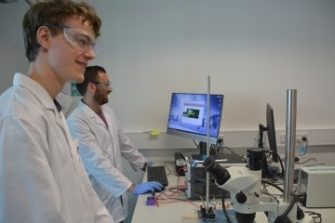
Primary bonds involve sharing or donating electrons between atoms to form a more stable electron configuration. Place your mouse over the image below to see how electrons are shared between atoms.
All elements except inert gases have an unfilled valence shell. For example, sodium has a nucleus containing 11 protons and orbiting shells containing 11 electrons. The outer shell has one valence electron.
Primary bonding occurs when electrons are lost or gained so that the outer shell is filled. For example, if a sodium atom loses its valence electron, it is left with a full outer shell of electrons and if a chlorine atom, which has only seven electrons in the outer shell, gains an electron, its outer shell is then full.



